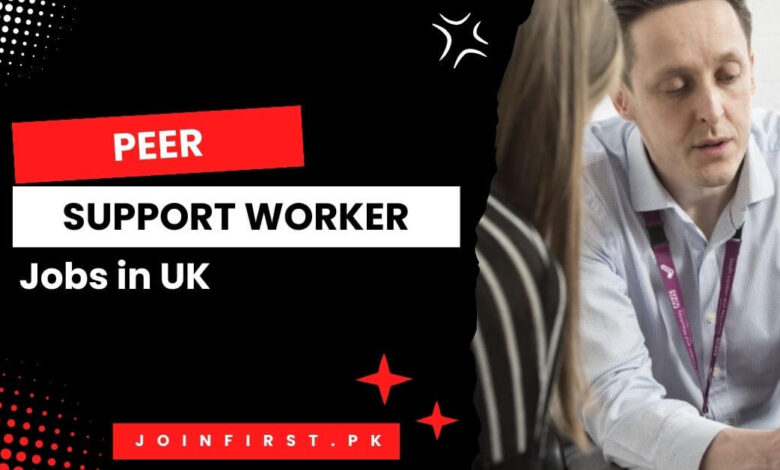Peer Support Worker Jobs in UK 2025 – Visa Sponsorship

The Peer Support Worker (PSW) will offer formalized peer support and assistance to service users, with a particular emphasis on pre- and post-diagnostic support, as a highly valued and essential member of the Adult Autism Diagnostic Service. The applicant who is selected will be responsible for providing pre- and post-diagnostic support to autistic adults (age 18+) in the London boroughs of Brent, Harrow, and Hillingdon as part of a multidisciplinary team in an Adult Autism Diagnostic Service.
The successful applicant may interact with service consumers or patients. We, as an NHS Trust, vehemently advocate for and support vaccination as the most effective method of safeguarding ourselves, our family, our colleagues, and, of course, patients and service users in our healthcare environments.
Check Also: Bariatric Therapy Assistant Jobs in UK – Visa Sponsorship
Key Points:
- Job Type: Full Time
- Location: London, United Kingdom
- Salary: 25,147 – 27,596 £ / Year
- Company: Central and North West London NHS Foundation Trust
Duties of Peer Support Worker Jobs in UK:
In order to enhance the outcomes of other autistic adults, the peer support worker role employs lived experience to provide direct support (through group and individual interventions) and indirect support (through the provision of lived experience support to staff across the trust). There is a growing consensus that a variety of social, economic, and environmental factors significantly impact the health of individuals. In order to offer assistance to service consumers, this position will consider these social determinants of health.
The PSW will advocate for their position by offering a variety of learning opportunities and information to the multidisciplinary team and other individuals throughout the trust.
The PSW will perform certain generic responsibilities in their capacity as an essential member of the autism team. The PSW will collaborate with service users on a one-on-one basis, and there may be opportunities for group work as the position is established. Additionally, the PSW will have the chance to collaborate with their counterparts.
About us:
CNWL (Central and North West London NHS Foundation Trust) employs nearly 7,000 personnel who deliver comprehensive healthcare services to Milton Keynes, a third of London’s population, and surrounding regions. We engage service users, caregivers, the public, personnel, and partner organizations in the operation of our organization.
Our catchment area encompasses a variety of communities, with over 100 first languages being spoken. It encompasses both regions of significant wealth and regions of significant poverty. We are dedicated to ensuring that the services we offer are tailored to the specific requirements of the individuals who utilize them. We also actively promote the participation of local residents who have the potential to make a positive impact.
We are proud of our diversity and are committed to implementing new initiatives that promote good relations and understanding among our staff by advancing equality for LGBT+, BME, and people with disabilities. We are acknowledged on a local, national, and international scale for our provision of innovative, high-quality healthcare. We are committed to hiring only the most exceptional individuals, and our experts are frequently requested to provide input on national health strategy and policy. Additionally, numerous models of our care have been adapted for use in other countries.
Benefits of Peer Support Worker Jobs:
- Empowerment and Personal Development: Peer support workers frequently discover that assisting others serves to bolster their own personal development and recovery. Empowerment and affirmation can be achieved by sharing their experiences and witnessing others benefit from their assistance.
- Job Satisfaction: The provision of meaningful assistance to others can result in high levels of job satisfaction. Peer support workers frequently derive a profound sense of purpose and satisfaction from the ability to make a tangible impact on the lives of others.
- Empathy and Understanding: Peer support workers possess a distinctive perspective on their responsibilities as a result of their personal experiences. This empathy and comprehension can cultivate robust, dependable relationships with the individuals they assist.
- Stigma Reduction: Peer support workers contribute to the reduction of the stigma associated with addiction and mental health challenges by candidly discussing their own successes and experiences. This has the potential to motivate others to seek assistance and candidly discuss their own challenges.
- Professional Development: A multitude of organizations offer training and development opportunities for peer support workers. This can encompass comprehensive training in crisis intervention, counseling techniques, and other pertinent skills that improve their career prospects and effectiveness.
- Supportive Work Environment: Peer support workers frequently operate in environments that prioritize mental health and wellness, where they are surrounded by colleagues who comprehend and provide assistance throughout their journey. This has the potential to establish a work environment that is both positive and nurturing.
- Flexible Work Options: A significant number of peer support positions provide the flexibility of working hours and part-time options, which can be advantageous for individuals who are juggling their personal obligations or recovery.
- Building Community: Peer support workers are essential in the development of supportive communities, both within their workplace and in the broader community. They assist in the establishment of networks of mutual assistance and support.
- Diverse Employment Opportunities: Peer support workers may locate employment opportunities in a diverse array of environments, such as hospitals, community health centers, educational institutions, and non-profit organizations. This diversity enables a variety of work experiences and environments.
- Improved Communication Skills: The position frequently necessitates effective communication, empathy, and active listening. These abilities are not only essential for the occupation, but they are also highly transferable to other aspects of life and work.
Responsibilities of Peer Support Worker Jobs in UK:
The Central and North West London NHS Trust is dedicated to delivering safe and effective services that provide a positive experience for both users and their supporters.
Clinical Responsibilities
- To work independently in conjunction with other professionals within the Autism Team to provide support to service users, with a specific emphasis on directing them to other support services after the diagnostic assessment and providing assistance during the interim period prior to diagnosis. This will require the ability to work in sensitive and intricate situations with individuals who may be neurodiverse or autistic.
- To assume a coaching role that supports service users, delivering the service using a neuroaffirmative approach in either individual or group settings.
- To serve as a role model for service users, sharing life experiences and lessons learned from my own lived experience of autism in order to inspire hope.
- To participate in the assessment, planning, implementation, and review of care in collaboration with the Autism Team.
- To actively assist service users in accessing community resources and actively promote and support independent living for service users in the community, including employment, specialized support, community living, and leisure. This will be achieved by maintaining extensive knowledge and connections with community resources. This will help service users recognize their personal interests, strengths, and objectives.
- To engage in group activities and community groups in collaboration with service consumers and occasionally team members.
Communication
- To greet, introduce, and orient the service user, their caregiver, and their families to the service.
- To assist the service user in preparing for meetings related to their care, such as assessments and evaluations.
- To assist service users in obtaining information regarding health promotion, mental and physical well-being, and substance use.
- To embrace and respect the personal beliefs, uniqueness, and identity of service users, as well as to help them comprehend their rights and choices within the service.
- To promptly notify the manager or senior clinician of any untoward incidents or unusual occurrences.
Service Development and Delivery
- To remain informed about the latest legislation, national and local policies, and issues related to peer support and autism.
- To be cognizant of any modifications to the trust’s policies, procedures, and guidelines, including those concerning confidentiality of information, health and safety, and equal opportunities.
- To be cognizant of, educate others, and confront concerns regarding stigma, low expectations, and anti-discriminatory practices as necessary.
- To participate in meetings regarding clinical, business, and service development as necessary.
- To increase the visibility of peer support both internally and externally through the co-delivery of presentations, workshops, and participation in trust-wide peer-related initiatives and audits, as well as information sharing as necessary and as agreed upon with the line manager.
Health and Safety
To ensure that the service environment is consistent with the Health and Safety and Trust Infection Control procedures.
Learning and Development
- To participate in trust-mandated training and development opportunities that are deemed appropriate for the PSW role and as outlined in the Personal Development Plan (PDP).
- To pursue professional development through peer support
- To participate in and commit to conducting an annual development review or appraisal
- To participate in peer support supervision in accordance with Trustwide policies.
- To receive consistent line management supervision as arranged by the ward or service manager.
- To ensure that the peer support role is secure and well-maintained, and to address the challenges of using lived experience to support individuals with potentially difficult and distressing issues, it is essential to utilize supervision, peer support with other peer workers, and any other necessary support.
Documentation
- To guarantee the accurate and timely recording of clinical-related data and information in the electronic patient record system.
- To ensure the accuracy of supervision records for peer support workers, as outlined in the Trust Guidelines, which includes the maintenance of a supervision record journal.
EDUCATION AND QUALIFICATIONS:
Essential
- Obligation to acquire fundamental knowledge through mandatory training and work-based learning, including accredited peer support worker training if not previously completed.
- Evidence of ongoing personal and professional growth
Desirable
Peer support worker training that is accredited Evidence of personal growth in the areas of autism awareness and peer support
PREVIOUS EXPERIENCE Paid/unpaid relevant to job:
Essential
- Own firsthand experience with autism
- I am willing to share my personal experiences of living with autism with service users and caregivers in a positive manner.
- Experience as a peer support worker (paid or unpaid) or in a related capacity in a variety of health and/or social care settings
Desirable
- Autism diagnosis
- Experience in conducting support sessions for individuals or groups
SKILLS, KNOWLEDGE, ABILITIES:
Essential
- Understanding of autism and associated neurodevelopmental disorders
- The ability to exhibit a non-judgmental comprehension of the issues that arise from being autistic, as well as an understanding of peer support
- Demonstrated proficiency in interpersonal skills and active listening, as well as the capacity to establish peer relationships with service users and caregivers.
- Ability to effectively communicate with a variety of audiences, both internally and externally, to the trust ability to offer assistance to other teams and conduct training as necessary Ability to exhibit empathy and forbearance, demonstrating an understanding of the effects of stigma and discrimination
- Understanding of the process of establishing community connections and networks
- Skill in devising innovative solutions and problem-solving to assist service users in achieving empowerment
- Good organizational skills and the capacity to work independently in a variety of environments
- A sensitive comprehension of diversity issues and the capacity to advocate for equal opportunities and anti-discriminatory practices
Desirable
- Basic comprehension of health and safety precautions
- Awareness of autism support services in the local area
- A practical understanding of the principles of co-production
- Interviewing abilities
- Understanding of policies and legislation that may facilitate assistance for service users
Disclosure and Barring Service Check:
This position is subject to the Rehabilitation of Offenders Act (Exceptions Order) of 1975. Consequently, it will be necessary to submit a disclosure application to the Disclosure and Barring Service (formerly known as the CRB) to verify any prior criminal convictions.
Certificate of Sponsorship:
All other applications will be considered, including those from job seekers who require current skilled worker sponsorship to work in the UK. For additional information, please consult the UK Visas and Immigration website (opens in a new tab).
Since April 6, 2017, skilled worker applicants who are seeking entry clearance into the United Kingdom have been required to submit a criminal record certificate from each country in which they have resided continuously or cumulatively for 12 months or more in the past decade. This requirement also applies to adult dependents who are over the age of 18. Guidance is available at this location. Checks of criminal records for applicants from abroad (opens in a new tab).
Frequently Asked Questions:
What is a peer support worker?
A peer support worker (PSW) is an individual who employs their personal experiences with mental health issues or other challenges to provide assistance to others who are undergoing comparable experiences. Mental health services employ them to provide emotional support, mentorship, and advocacy.
Is there any support available for peer support workers?
Indeed, a significant number of employers provide supervision and assistance to psychosocial workers. This may encompass peer support networks, access to counseling services, and regular supervision meetings.
What is the salary range for a peer support worker in the UK?
The compensation for peer support workers is contingent upon their employer and location. The annual salary typically falls within the range of £18,000 to £25,000. NHS positions typically compensate PSWs according to the Agenda for Change pay schedules, often starting at Band 3 or Band 4.



